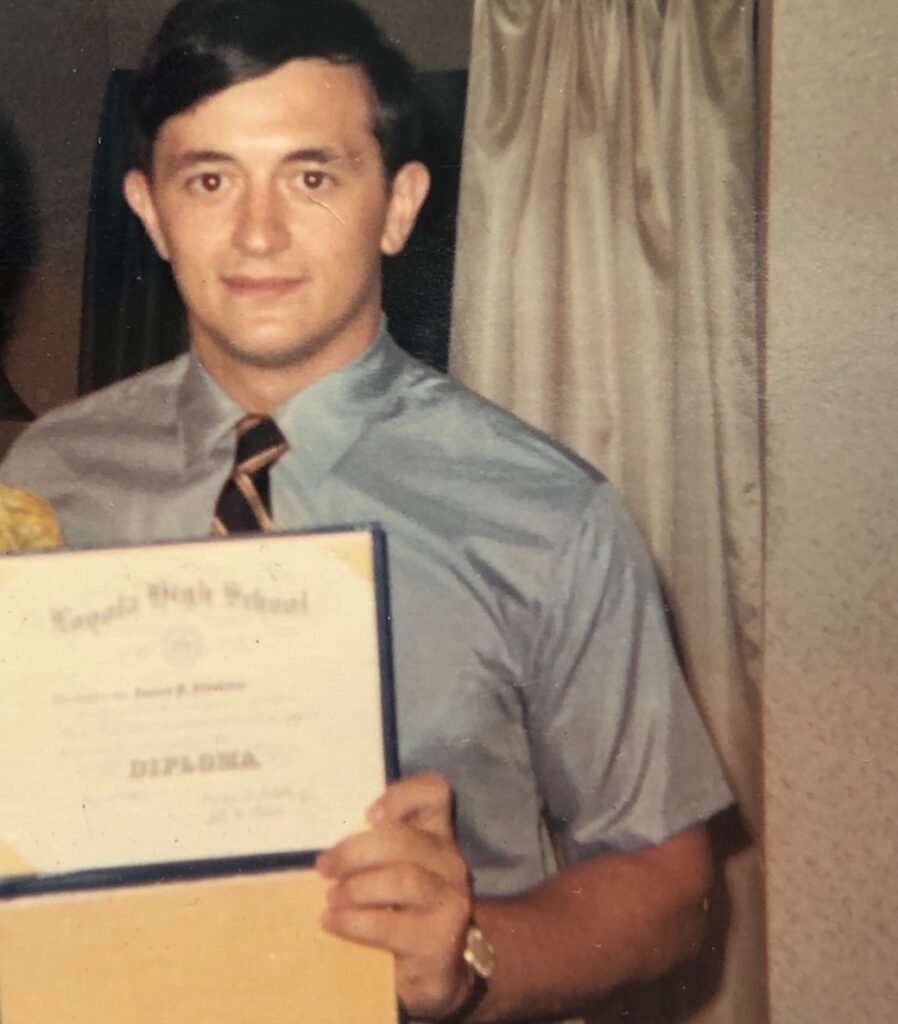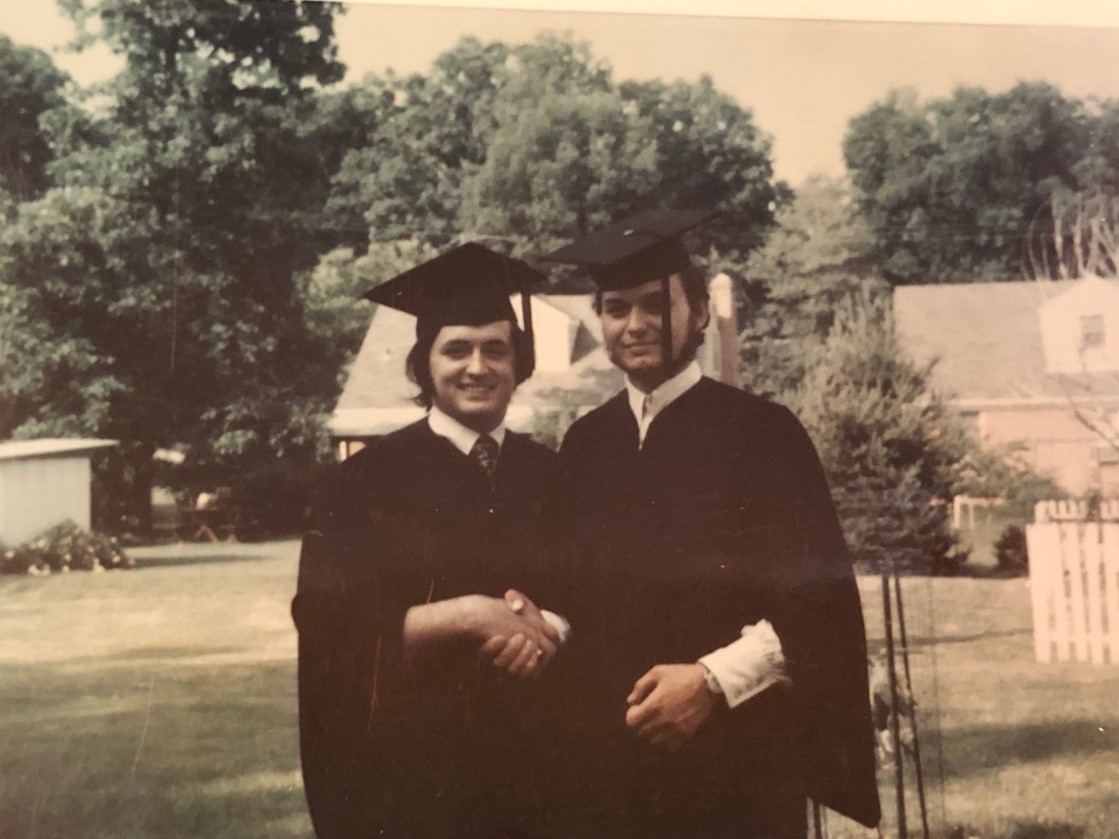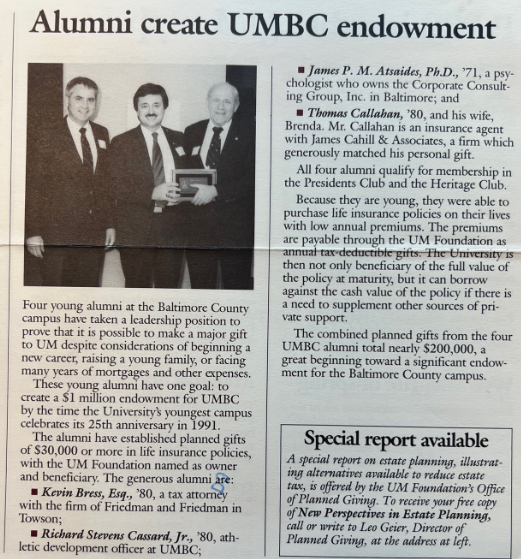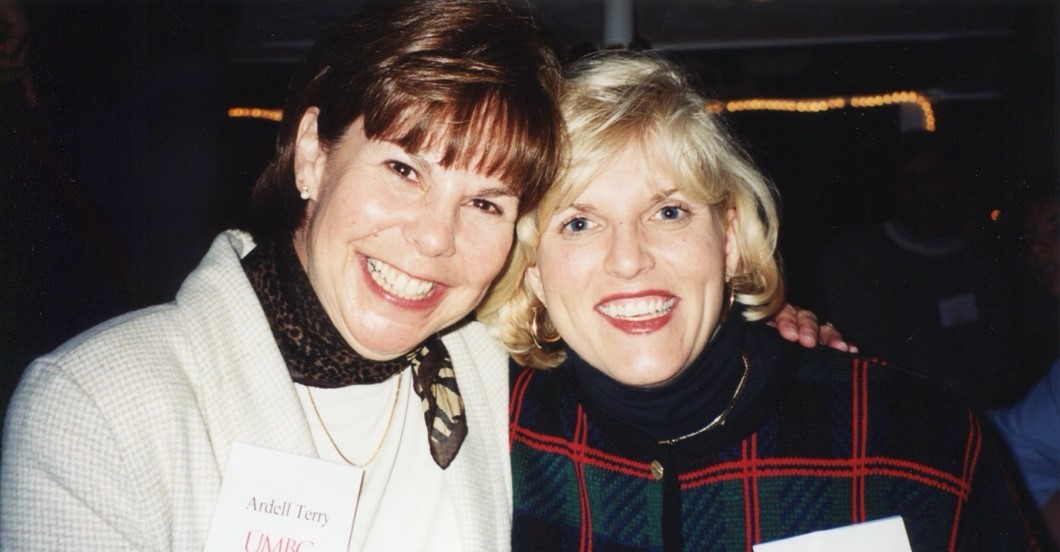Meet James Atsaides ‘71, psychology. Jim is a Founding Four member, a management psychologist, a former Alumni Association Board of Directors president, a former adjunct faculty member, and a planned giver to the university. In 2023, Jim established the Dr. James P. Atsaides Endowment through his life insurance policy. But, most importantly of all, Jim met his wife Ardell Terry through his philanthropic work with the university. Recently, Jim took some time to reflect on his UMBC story. Take it away, Jim!
Q: What is your WHY? What brought you to UMBC?
A: I graduated from Loyola High School in 1967, and it was already a “done deal” that I would attend the University of Maryland, College Park. My brother, Sam Atsaides, was already there, which made things easier for my parents. So off I went.
Sam was a year ahead of me, and for his first year, he lived on campus. When I went there, the plan was for us to get an apartment with a few other roommates—cheaper than living on campus. When school started, Sam helped me figure out how to enroll in classes and what classes to take. I decided to become a psychology major.

College Park was huge. I got lost right away. I wasn’t in high school anymore. It was also a rude awakening to how big the classes were. I was used to having 20 students in a class, but now there were 100 – 300 students in the freshmen classes. It took me weeks to get used to the size of the classes and how impersonal the school was.
Quickly, I realized that I was struggling. Sam was not a model student and always wanted to “wing it.” I couldn’t do that. Also, classes were hard, and I was also finding it difficult to make friends.
Year two at College Park was not much better—the same apartment, the same roommates, and an added twist. It was 1968 and the Vietnam War was getting a lot of attention. Students were staging “sit-ins,” and there were protest banners all over campus. I remember walking around campus wondering, “What am I doing here?” Adding to the chaos, Rev. Dr. Martin Luther King, Jr. was killed in 1968, leading to further unrest in the Washington, D.C., area.
After my second year of college, I decided I needed a change—a bold move. I decided to drop out of school. I mentioned to my parents that I needed some time off, and they understood what I was feeling. After a few jobs, I came back to my parents’ home in Catonsville and helped them at the family restaurant, Kibby’s. That’s where I first heard people talking about the new college just down the street, the University of Maryland, Baltimore County. So, I decided to check it out.
I drove to UMBC and walked around. It had only been built within the last few years and there were only a few buildings. But I liked it. Even though there was lots of dirt and mud all around, it felt just right—I felt safe. It was a small campus, unlike College Park. The students were walking with smiles on their faces, and I felt like I could relate to them. I talked it over with my parents, and the next semester I enrolled at UMBC.
Q: Tell us about what you loved most about your academic program. Was there anyone in the community who helped support you?
A: I decided to remain a psychology major and was impressed with all the courses that I could take at UMBC. I was like a kid in a candy store, just happy taking classes that were meaningful to me. The professors were also more approachable, and I started making friends. UMBC felt like home.
One friend in particular, Stan Sack, was a tremendous help. He was a fellow psychology major and had been at UMBC from the beginning. We studied together and talked about classes and professors, and he helped guide me throughout my time at UMBC. Stan helped make my time at UMBC a happy experience. As a result, my grades improved. I felt excited and energized with what I was doing.

The classes I was taking also offered lots of different experiences. During an archeology class, we took a trip to the Walters Art Museum. As part of a project in a sociology class, I got to interview a local brewery manager and learn how his business impacted the community. This was a particularly meaningful experience because I always enjoyed business. I think it gave me the drive to focus on industrial psychology years later. I also did an internship at Spring Grove State Hospital, which was very meaningful in a different way as it made me realize that I did not want to become a clinical psychologist!
Q: What’s the one thing you’d want someone to know about the support you find here?
A: My time at UMBC went very quickly, but UMBC was my “savior” in a lot of ways. UMBC and the supportive community gave me the positive university experience I always wanted. UMBC also gave me direction and helped me figure out what I wanted to do with my life. I look back on my time as a UMBC student very fondly. However, it would not be my last go-around with the university.
My time at UMBC made me realize that I enjoyed learning. So I just kept going to school. I completed a master’s program at Springfield College and a Ph.D. program at the University of Kansas.
Q: Can you tell us about your career in psychology?
A: My career took me from Kansas to Oregon to work with an international firm of management psychologists. In the early 1980s, my parents and family decided to build a hotel resort on the Greek island of Rhodes where my mom had a large parcel of land. For this to materialize, however, I had to leave my career and come back to Baltimore to take over Kibby’s, the family restaurant. So in 1983, my family loaded the Hertz rental truck and settled back in Catonsville with two very young girls.
As a management psychologist, I took my own advice and hired a very good general manager to run the restaurant. This allowed me to start my professional practice in Baltimore in 1985. During this time, I met a fellow psychologist who became a very close and dear friend, John Martello. John was in a senior position at UMBC. We hit it off very well, and we spent much time talking about the work we were both doing, as well as our experiences at UMBC. John was instrumental in introducing me to the senior staff at UMBC. He introduced me to not only the head of the psychology department but also to the president of the university, Michael Hooker.
I enjoyed getting back on campus. The campus had grown so much and was still growing!
“I am grateful for my time at UMBC and have appreciated the many life-long opportunities it has given me as an individual and as a professional.
Q: What drives you to support this community?
A: In the late 1980s, President Hooker contacted me and asked me to join the UMBC Alumni Association Board of Directors. I happily accepted.
During this time, UMBC was promoting an insurance program that alumni could establish that would create an endowment for UMBC. President Hooker and Nell Savopoulous, director of development at UMBC, asked if I would participate. I felt such a close connection to UMBC, that I said “yes.” This was my alma mater after all. Now, I just had to figure out what and who my endowment would benefit.

As an industrial psychologist, I’m required to attend regular educational programs for continuous education (CE) credits. Students also regularly attend these conferences to make connections and gain exposure to the industry. However, these conferences are not cheap. My grandson, Dustin, for example, was graduating from Ithaca College and was honored with a request to present his senior research at a conference in Phoenix, Arizona. He was delighted with the opportunity but had to figure out how to cover airfare, lodging, and other expenses not included in his conference registration. Dustin quickly learned that there were no grants or scholarships available from the school to help him. So, he had to ask his parents and grandparents for money.
As my wife and I thought about Dustin’s situation, we both said, “Wouldn’t it be a good thing to have students apply for grants for this type of situation?” As we discussed this, we realized that we could focus the Dr. James P. Atsaides Endowment to help graduate students in need of funding to attend conferences.
I am grateful for my time at UMBC and have appreciated the many life-long opportunities it has given me as an individual and as a professional. Creating an endowment for students has been a wonderful way for me to say “Thank You” to the university and to help future students. And I am excited to share that we will award our first scholarship this academic year!
“Dr. Atsaides’ generosity to give back to both UMBC in general and our I/O Psychology program, in particular, is a testament to his professional values and his commitment to his alma mater,” says Dr. Elliot Lasson, professor of the practice and Director of UMBC’s I/O Psychology graduate program. “We look forward to using his gift to support our graduate students for years to come.”
Q. What has been your most meaningful connection at UMBC?
A: Through my work with the university, I was fortunate to meet Ardell Terry, campaign manager for UMBC. She was a positive addition to the fundraising group. Ardell and I married, and we have been together now for over 20 years. I thank UMBC for the opportunity to meet her as well.

Q: How have you stayed connected with UMBC?
A: In 1990, I was asked to teach an upper-level class in organizational psychology and joined the UMBC community in a new capacity—adjunct professor. I greatly enjoyed teaching the class and did so for nine years.
Along with my time on the UMBC Alumni Board, President Hooker asked me to represent the university as a member of the University System of Maryland Chancellor’s Advisory Council. This was truly an honor for me to represent my alma mater and be part of this historic transition to a state-wide education system.
In 1992, I was asked to be part of the selection committee for the next president of UMBC. As many of you probably know, this is the historic search that elevated Freeman A. Hrabowski, III, to the role of president, which he held until he retired in 2022.
In 1995, I was asked to take the position of president of the UMBC Alumni Board. This was a tremendous honor for me and allowed me to work closely with the administration. In my role as board president, I had the opportunity to be on stage while my younger cousin graduated from UMBC, which was really special.
UMBC continues to be close to my heart. It has been a large part of my life, and I am sure it will continue to be. I am honored to give back to the university in any way I can.
* * * * *
UMBC’s greatest strength is its people. When people meet Retrievers and hear about the passion they bring, the relationships they create, the ways they support each other, and the commitment they have to inclusive excellence, they truly get a sense of our community. That’s what “Meet a Retriever” is all about.
Learn more about how UMBC can help you achieve your goals.
Tags: Endowments, Meet a Retriever, Psychology

